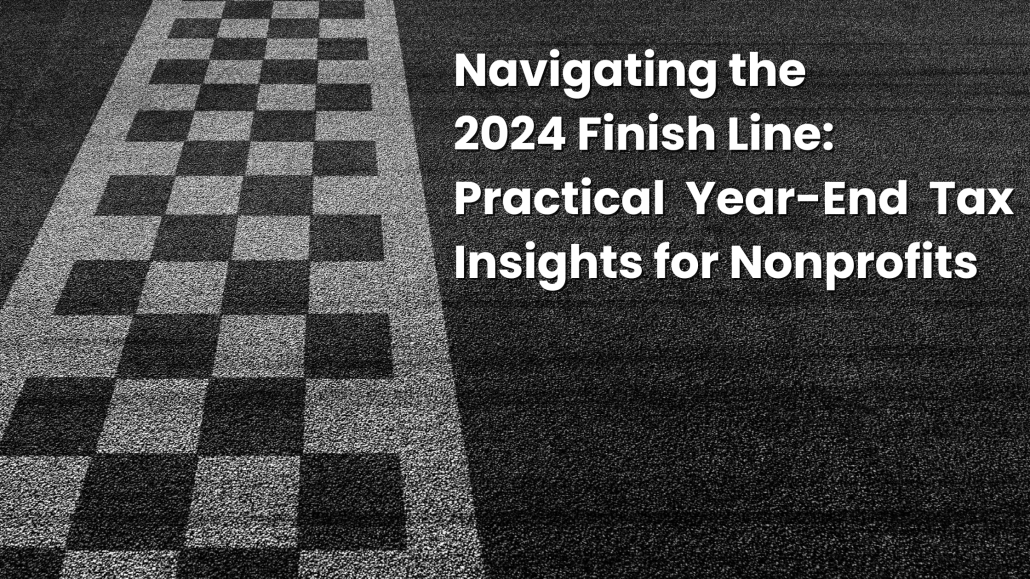
As 2024 comes to a close, nonprofit organizations have a prime opportunity to ensure their financial health is on track for the coming year. Beyond fulfilling their mission, strategic tax planning allows nonprofits to conserve resources, stay compliant, and prepare for future growth. Whether you’re a small community charity or a larger nonprofit institution, careful tax planning can ensure you’re making the most of every available advantage. Below are some key strategies to consider, along with insights on how working closely with a trusted CPA can support accurate reporting and long-term sustainability.
Review and Leverage Available Deductions
Nonprofits don’t operate under the same tax framework as for-profit businesses, but that doesn’t mean there aren’t valuable deductions and credits to consider. If your organization generates unrelated business income (UBI), carefully documenting and deducting all allowable expenses is crucial. Consider potential deductions for depreciation, charitable contributions made to other qualified organizations, and any expenses that directly support your nonprofit’s exempt purposes. A detailed expense review, conducted before year-end, can uncover opportunities to reduce taxable income and keep more funds available for advancing your mission.
Ensure Compliance with Updated Tax Regulations
Tax regulations evolve continuously, and 2024 has been no exception. Recent changes may affect filing thresholds, deductible expenses, or new disclosure requirements on Form 990. Staying current with these rules ensures that your organization avoids costly penalties and maintains its good standing. Keep a close eye on new IRS guidance related to donor acknowledgment letters, volunteer expense reporting, or classifications of certain charitable programs. If your team is unsure about these changes, partnering with a CPA who is familiar with the latest regulations can help your organization remain confident and compliant as you approach year-end.
Align Your Financial Reporting and Budgeting Efforts
Year-end tax planning isn’t just about compliance—it’s also about creating a strong foundation for the year ahead. Review your budgeting and financial forecasting to ensure your resources align with current obligations and future programs. Consider adjusting the timing of certain expenses or contributions to maximize current deductions and ensure smooth cash flow into the new year. When done thoughtfully, these adjustments can enhance financial stability, allowing you to focus on high-impact initiatives rather than scrambling to manage unforeseen tax burdens.
Strengthen Internal Controls and Documentation
Accurate, detailed recordkeeping is vital for demonstrating compliance and eligibility for deductions. Make sure your documentation processes are current and that every expense and contribution is accurately categorized. If your team finds it challenging to maintain rigorous internal controls and proper documentation, consider a year-end check-in with a CPA. Their guidance can help you implement better recordkeeping practices, minimizing errors and making future tax filings more efficient and less stressful.
Seek Tailored Professional Guidance
While general strategies can certainly help, nothing compares to advice tailored to your nonprofit’s unique circumstances. A CPA who specializes in nonprofit accounting and tax matters can pinpoint opportunities that may go unnoticed and help you navigate any compliance gray areas with confidence. They bring a trained eye to your financial records, ensuring that you’re capturing all eligible deductions and credits while steering clear of common pitfalls. By working closely with a CPA, you set the stage for accurate reporting, stronger financial sustainability, and clarity as you move into a new fiscal cycle.
Position Your Nonprofit for a Strong Financial Future
Year-end tax planning shouldn’t feel like an administrative headache. Instead, it can be a strategic moment—an opportunity to refine your approach, optimize deductions, and ensure total regulatory compliance. By leveraging every available advantage, your nonprofit can focus on what truly matters: delivering on its mission and positively impacting the community it serves.
From reviewing expense allocations to interpreting the latest IRS regulations, the guidance of a seasoned CPA can help ensure that every financial decision you make supports your nonprofit’s long-term sustainability. With the right planning and professional insight, your organization will be poised to thrive, both financially and operationally, in 2025 and beyond.


